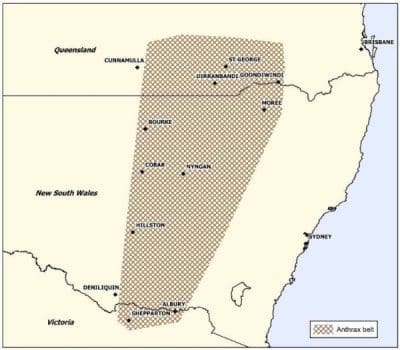QUEENSLAND’S Department of Agriculture says another case of anthrax in cattle has been confirmed in the Dirranbandi-St George area this month.
The detection is the fourth incident in cattle in the region since 2016.
The Department says animal owners in southern Queensland – particularly in the Dirranbandi to St George area – should be alert to anthrax and the risks to human and animal health.
Vaccination of livestock can prevent unnecessary livestock deaths.
Livestock producers have been encouraged to talk to their private veterinarian about anthrax vaccination.
All producers have also been reminded of their general biosecurity obligation (GBO) in preventing and managing incidents of anthrax.
“In any case of sudden death of livestock, you should avoid handling the carcase and contact a private veterinarian who can assist in determining the cause and provide biosecurity advice to protect human and animal health,” the Department said.
Anthrax can infect humans (meaning there are additional considerations to be made to protect people), and incidents in livestock can have significant economic, environmental, and animal health and welfare impacts.
Anthrax typically presents as sudden death in livestock; can affect a wide variety of species (cattle, sheep, goats and camelids are particularly susceptible); often causes carcasses to bloat quickly; and may cause bloody or tarry discharges from carcass orifices
It can affect one to two animals in small incidents, and exceed 100 animals in large outbreaks.
Soil that is contaminated with anthrax can be infective for decades (see map of the ‘anthrax belt’ below).
Management of an anthrax incident may include disposal, decontamination and vaccination.
Source: QDAF. More information about anthrax in livestock click here. For more information about anthrax in humans click here.

